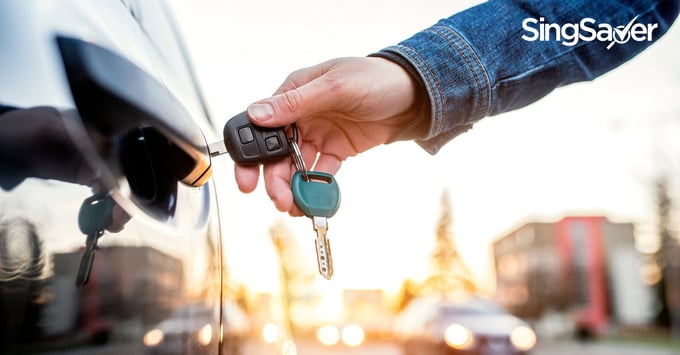Buying a car in Singapore, whether new or second-hand, is a significant financial commitment.
Just like buying a house, purchasing a car in Singapore will often lead to huge financial implications on the average driver. Instead of blindly jumping into a purchase and end up suffering from buyer's remorse, we've come up with 7 important factors to consider before buying a car in Singapore.
1. Budget and affordability
First-time car owners will often be tempted to splurge on their first car. After all, who wouldn't want a brand-new Mercedes or BMW to show off to their peers and family?
As tempting as it may seem, you should think sensibly and hold off that dream of driving a luxury vehicle. As the saying goes, it's important to "live within your means". Don't make the mistake of purchasing a car that you won't be able to upkeep.
Before deciding on a vehicle, always ask yourself the following question: "Do I really need such an expensive car, when a more affordable one will suffice?" While you're at it, also ask yourself this: "Will the financial implications weigh me down the next few years?"
Remember, a car should be treated as an asset that makes your life easier, not a commodity that ties you down financially.
Besides the aforementioned points, you should also consider the many additional costs and fees of owning a vehicle. These additional costs compound over time and they include vehicle maintenance fees, road tax, car insurance, parking, as well as petrol. Remember to factors these costs into your decision when buying a vehicle.
For current car owners, one advantage you have is that you're able to sell your existing vehicle to offset the down payment of the new car. If the value of your car is high enough, you won't need to fork out a single cent for the down payment.
One way to maximize your returns is by getting an accurate market valuation of your vehicle from multiple sources. To do that, you can either drive down to the dealerships to get a valuation, which honestly is quite troublesome, or you can get a complimentary, no-obligation car valuation here within 24 hours.
2. Car functions and features
Like the first point, it's important to pick a car that suits your needs and lifestyle. Sure, a two-door convertible might be a huge boost to your ego but think of the trouble when ferrying your elderly parents around or the hassle of installing a child seat at the back.
To help yourself make a more informed decision, make a list of specifications or modifications that your car should have. This list can also be helpful with budgeting, as it will help you determine how much money you'll be willing to spend on these mods and specs.
3. Authorised dealers vs parallel importers
The easiest and most convenient way to buy a car in Singapore is either through an authorised dealer or a parallel importer. What's the difference between the two? Here are the pros and cons:
Authorised Dealers (AD)
+ Usually more reliable (have to uphold brand standards)
+ Exceptional after-sales support (warranty, free servicing, trustworthy workshops, etc.)
+ Well-stocked with replacement parts
+ Cars are most likely to be compatible for Singapore roads (vehicles are made from regional factories)
- Cars tend to be more expensive
Parallel Importers (PI)
+ Cars are usually cheaper (due to lesser overhead costs)
+ Carry a wider range of car models
- There have been instances of parallel importers "running away" after closing deals
- After-sales support less reliable (warranties tied to 3rd party workshops and other service providers)
- You might be dealing with many different parties throughout the ownership of your car
- Lack of replacement parts
- Cars are imported from the brand's country of origin, and may not be suitable for Singapore roads.
Ultimately, it boils down to confidence and value. If you're looking to purchase a car with greater confidence, go with an authorised dealer. For those looking to save some money, or know exactly which car make or model they want, go with a parallel importer.
Knowledge is vital, so remember to do your own research when shopping for a car.
4. Buying new vs second-hand
Once you've settled on a distributor, your next decision is whether to buy a new or second-hand vehicle. Besides the cost, depreciation, rebates and other financial considerations, you'll also need to ask yourself the following questions:
1) Is money an issue?
If money isn't an issue, you should consider buying a new car. If you can't afford the initial down payment, a used car might be a better option.
2) What is your risk appetite?
Do you have the stomach to handle the issues that a used car might come with? Remember, a second-hand car might come with certain underlying problems.
Although protected under the "Lemon Law", you won't be able to seek redress from the dealer if:
- the defects were caused by your own misused,
- the fault was caused by wear and tear, and
- the defect was not inherent at the time of purchase.
3) How soon do you need a car?
Bidding for the COE of a car can be a tiresome affair, especially if your bid fails the first few times. After the COE bidding process, there's still the wait for your car to arrive. That can take anywhere from a few weeks to a couple of months.
If you urgently require a car, a second-hand vehicle might more viable.
4) How long will you be driving the car?
If you are looking to drive for two years or less, a second-hand vehicle is the obvious choice. For something more long-term, buying a new car would be a better option.
5. Shopping for competitive prices
For those that have decided on a second-hand car, be sure to look around different dealerships and consider your options. Don't settle with the first dealership that you visit. Instead, look around and you're bound to find different prices for that car you want.
One trick you can try is to negotiate for a cheaper price and wait a couple of days. If you're lucky, the car salesman might sell you the car at your preferred price. The salesman might even give you free adds-on for making a purchase. It doesn't hurt to be friendly when negotiating either.
With that said, remember to be tactful and take careful considerations to these freebies offered to you. Don't readily accept products that you don't necessarily need. Instead, ask for accessories or services that would be beneficial to you and your vehicle.
6. Test driving and getting your car inspected
This goes without saying, but you should always take a second-hand car on a test drive and get it inspected before signing on the dotted lines.
Pay attention to the slightest details when test driving, which includes the sound of the engine, the car's handling and steering, and the brakes. As far as car inspection goes, remember to visit a trusted workshop or mechanic.
The importance of both test drive and vehicle inspection cannot be overstated. Don't forget, the safety of your passengers and yourself should be of utmost importance.
If you don't feel at ease when test driving the car, or if your mechanic finds a problem he can't fix, maybe its best to select a different vehicle.
7. Loan amount and payment terms
Just like car shopping, you too should look around for the best deals when it comes to loans. Approach different banks to see what each of them can offer you. Some banks might offer you lower interest rates, while others might offer you more flexible terms and conditions. Some might even throw in freebies when taking a loan from them.
At the end of the day, it's important to look at the interest rate charged and the features of the loan. A longer loan term or a smaller instalment amount might not necessarily be the best option as you'll probably end up paying more in interest over your loan tenure.
Read more: Why Your Car Loan Interest Is Secretly Double What It Seems
Remember, taking a loan is a huge financial commitment, so always be sure to shop around for the best rates. Also, be sure to look at the Effective Interest Rate (EIR) rather than the advertised flat rate for a more realistic estimation of how much you'll be paying for the loan. Compare and apply for your car loan via SingSaver for some of the best promo rates and welcome gifts in town.
Read these next:
Are You Ready to Get a Car Loan in Singapore?
7 Reasons Not To Buy A Car In Singapore
Car Loan Hacks for New and Used Cars
Renew COE: 5 Reasons Why It’s Better Than Buying a New Car
This is How Much You Can Borrow From Different Loans in Singapore

By Motorist.sg
Motorist.sg is Singapore's leading autoconcierge vehicle platform. We help you manage your vehicle and provide you with a range of auto services, such as selling or scrapping your car, COE renewal and auto insurance.
Similar articles
With Rising Car Prices, Which is Better – Used Cars Vs New Cars?
The Price of Buying A Second-Hand Car — What You Need To Know About COE And Insurance
Is It Really Worth Buying A Cheaper Red-Plate Car?
5 Tips To Save Big On Your Next Car Purchase
Lemon Law In Singapore – What It Is, How It Works, Getting Refunds
Guide To Getting A Motorbike Licence In Singapore And Price Of Buying A Motorcycle
Best Second-Hand Used Cars to Buy in Singapore
Renew COE: 5 Reasons Why It’s Better Than Buying a New Car










